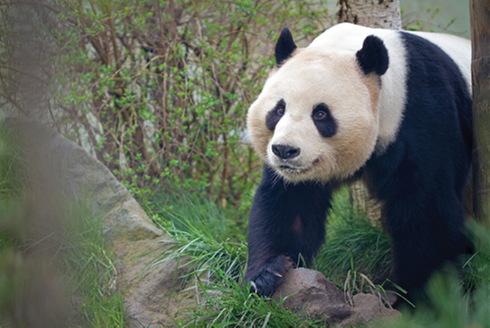Quality is new mantra of conservation

Now that lovable animal is off the endangered species list, efforts are concentrating on improving its genes
Giant pandas, the national treasure of China, are a potent symbol of the country and of worldwide conservation work. Additionally, they represent diplomatic, educational, cultural and trade links between the People's Republic of China and other countries holding pandas.
|

|
| Giant panda Yang Guang explores his enclosure at the Edinburgh Zoo. RZSS EDINBURGH ZOO |
Hugely important to any zoological collection, pandas have an all-consuming, charismatic appeal but, even more important, the giant pandas in Western zoos are "ambassadors" for their species and a "bridge" of scientific cooperation between the zoo and its Chinese partner.
In 2015 it was announced, with great fanfare, that the wild panda population had increased to around 1,864 and, with our Chinese partners (the China Conservation and Research Center for Giant Pandas) now heavily involved in panda reintroductions within reserves containing isolated populations of pandas or into corridor reserves, the increasing need to produce "quality" instead of "quantity" pandas is now the mantra within the conservation community.
In 2016, the giant panda was downgraded from its International Union for Conservation of Nature red list status of "endangered" to "vulnerable", another reason to celebrate the success and work being conducted in China for this species, led by the Chinese government.
The panda conservation program is very much a model for other species conservation programs. It is holistic in its approach, the wild and captive population being managed as one with gene flow now occurring between the two.
This all means that, in tandem with large scale forest restoration projects, the name of the game is to produce pandas that are genetically sound, physically healthy and mentally fit for the reintroduction program.
Much important research work to help us understand the complex and delicate biology of this species has already been carried out, but much more needs to be done and there are still many mysteries in panda biology.
Additionally, new and emerging threats such as climate change and diseases mean that we cannot be complacent and it is possible new approaches toward panda conservation work will need to be adopted in the future to mitigate these threats.
Pandas are a biologically complicated species, their diet resulting in an interesting breeding strategy and an altered physiology that makes them fascinating to study and research.
All of this is no more true than for our two pandas here in Edinburgh, Yang Guang and Tian Tian, who arrived in late 2011. Both continue to delight millions of visitors to Edinburgh Zoo but, equally important, they help fund conservation work for pandas in China and have allowed us to develop numerous research projects, centered around pandas and their habitat, with a variety of scientific institutions in the UK and in China.
Therefore, the skills and expertise held within all organizations holding pandas both inside and outside of China are brought to bear within these efforts to help secure this charismatic, adorable mammal for future generations.
The author is the director of the Giant Panda Programme at the Royal Zoological Society of Scotland. The views do not necessarily reflect those of China Daily.

































